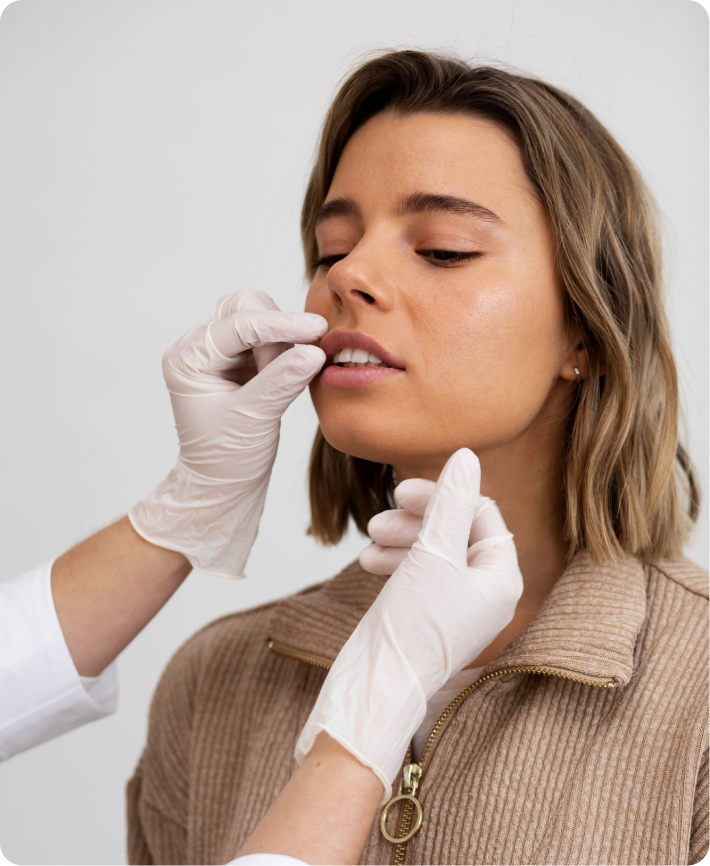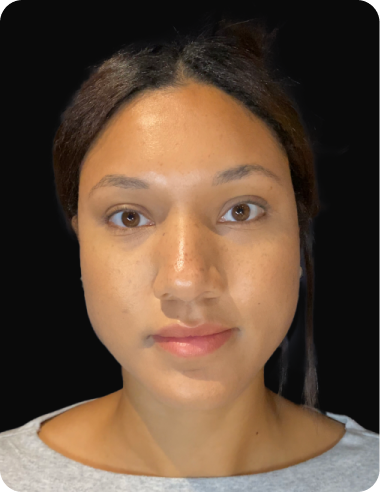Botox for bruxism (teeth grinding) and TMJ disorder
For patients who clench or grind their teeth during the day or when they sleep, targeted botox injections offer a gentle and effective solution to bruxism.
Botox is also widely recognised as an effective way to reduce the discomfort caused by the symptoms of temporomandibular joint (TMJ) disorder.
We offer botox for bruxism and TMJ disorder at our Harley Street and Colindale, London clinics. Our expert practitioner will be able to assess your specific concern to ascertain whether this is a suitable treatment for you.
You will experience your treatment at one of our luxurious, award-winning London aesthetic clinics, led by Dr Kaywaan Khan.

Treatment Explained
Botox for bruxism and TMJ disorder
treatment overview
Treatment Type
Injectable botox
Downtime
None
Treatment Areas
Jawline, masseter muscle
Benefit Duration
3-6 months
Treatment Time
15-30 minutes
Aftercare
Minimal (your practitioner will advise)
Treatment Type
Injectable botox
Treatment Time
15-30 minutes
Treatment Areas
Jawline, masseter muscle
Benefit Duration
3-6 months
Downtime
None
Aftercare
Minimal (your practitioner will advise)

Botox for bruxism
(teeth grinding) and
TMJ disorder benefits
-
Reduction in the incidence of bruxism
Botox is well-known for its use in aesthetic medicine for gently reducing facial muscle activity to minimise expression lines and wrinkles. Botox can also be effectively used to relax the masseter muscle within the jaw. By reducing the activity of the masseter muscle, the incidence of bruxism (teeth grinding and clenching), which can be damaging to dental health, is reduced.
-
Alleviate the symptoms of TMJ disorder
The symptoms of temporomandibular joint (TMJ) disorder can include bruxism, discomfort while chewing, difficulty opening the mouth fully and pain in the jaw and temples. Targeted botox injections into the masseter muscle are known to alleviate these symptoms.
-
Achieve a slimmer jawline
Bruxism and TMJ disorder can contribute to an enlarged masseter muscle, which causes a wider jawline with a squared contour.
Because treatment with botox relaxes the masseter muscle in the jaw, this can reduce its size and create a slimmer, more contoured jawline. Check the treatment page
Botox for bruxism and TMJ
disorder, London prices
Talk to us about botox for bruxism and TMJ disorder
| Gummy Smile | £190 |
| Masseter Botox Botox for bruxisim | £300 |
Bruxism and TMJ botox before and after
See the benefits for yourself.
 Before
Before
 After
After
 Before
Before
 After
After
Botox for bruxism (teeth grinding)
and TMJ disorder reviews
Calf augmentation
Alexander Thompson
Visiting Hannah London was an absolute game-changer for me. I've been struggling with Bruxism for years, constantly waking up with jaw pain and headaches. That all changed when I met Dr. Kaywaan. His expertise in using Botox to treat my condition was nothing short of brilliant. Not only did he thoroughly explain the process, making me feel completely at ease, but the results were also remarkable. I've noticed a significant reduction in jaw tension and overall discomfort. It's not just about the relief; it's about regaining quality of life. Thank you, Dr. Kaywaan and the Hannah London team, for your exceptional care and professionalism.
Sophia Patel
I cannot praise the Hannah London team enough! After suffering from TMJ disorder for what felt like forever, I finally found relief thanks to their skilled practitioners. The Botox treatment I received was tailored specifically to my needs, and the care and attention I received from the team were outstanding. Not only did the treatment significantly reduce my jaw pain and discomfort, but it also improved my ability to eat and speak without pain. The team's dedication to providing personalized care in a warm and welcoming environment truly sets them apart. I'm so grateful to have found Hannah London and highly recommend their services to anyone in need.
The science behind botox for bruxism
and TMJ disorders
Bruxism is grinding or clenching of the teeth whether during the day or when you are asleep. The reasons why patients grind their teeth isn’t always clear, but it can be linked to factors including stress and anxiety, sleep issues, certain medications, and lifestyle choices such as smoking or alcohol and caffeine intake.
Temporomandibular joint (TMJ) disorder is regarded as a multi factor condition, which means there may be several contributing factors that cause the condition. These can include genetics, bruxism, stress or anxiety or trauma to the joint.
The symptoms of TMJ disorder include pain in the jaw or temples, a clicking sound during chewing or speaking, and issues with opening your mouth fully.
Botox, or botulinum toxin, temporarily relaxes muscles through blocking certain nerve signals.
When botox is carefully injected into the masseter muscle, which is one of the primary muscles in the jaw responsible for mastication (chewing), the muscle is gently relaxed.
This reduction in the activity of the masseter muscle reduces the incidence of bruxism and can alleviate the symptoms of TMJ disorder.
Botox for bruxism and TMJ disorder has the additional benefit of reducing the size of the masseter muscle to create a slimmer jawline Check the treatment page
You can be reassured that although injections are being made into your masseter muscle, there is no restriction to mobility or to the function of the jaw.
Botox for bruxism and TMJ disorder
- your questions answered
Meet one of our doctors for a consultation to discuss your treatment options
-
What is botox for jaw clenching, bruxism and TMJ disorder?
When botox is carefully injected into the masseter muscle, which is one of the primary muscles in the jaw responsible for mastication (chewing), the muscle is gently relaxed.
The reduction in activity of the masseter muscle reduces the incidence of bruxism and alleviates the symptoms of TMJ disorder. -
Is botox for bruxism and TMJ disorder safe?
Yes, injections with botox are safe when administered by a reputable aesthetic practitioner. They have minimal side effects.
-
Does botox for bruxism and TMJ disorder hurt?
With botox, the needles used are very fine, therefore patients tend to feel only a mild prick sensation that quickly passes.
-
What are the side effects of botox for bruxism and TMJ disorder?
While there can be some swelling and redness, this is often minimal and settles quickly. Bruising can occur in some cases, but is less common in the masseter region. Tightness and soreness often subsides within days.
-
What is the precare and aftercare required?
Prior to treatment, we advise patients to prepare the skin by keeping hairs in the affected area trimmed or shaved if possible.
You should not drink alcohol and any blood thinners should be withheld on the day of the procedure, as advised by your doctor.
Following the procedure, keep the area clean and dry and avoid heavy exercise, steam/sauna, smoking and alcohol for 72 hours.
-
How long does botox for bruxism and TMJ disorder last?
The results of treatment last up to 3 to 6 months. This can vary person to person.
-
What are the benefits of botox for bruxism and TMJ disorder?
The benefits of botox for bruxism and TMJ disorder include:
● Reduction in the incidence of bruxism (teeth grinding)
● Alleviation of the symptoms associated with TMJ disorder
● Reduction in the size of the masseter muscle for a slimmer jawline -
Has botox for bruxism and TMJ disorder ever gone wrong?
We're not aware of any problems following treatment, where it was administered by a trained medical professional.
-
What does botox for bruxism and TMJ disorder cost?
Please see above for our price list for botox for bruxism and TMJ disorder.
Meet one of our doctors for a consultation to discuss your treatment options
Welcome to
Hannah London
We’re a team of aesthetic and medical specialists lead by Dr Kaywaan Khan. We provide award-winning facial, body and hair treatments to clients across London.
Our ethos is to offer cutting-edge treatments in a luxurious setting, ensuring that you leave our clinic feeling pampered and looking fabulous.

